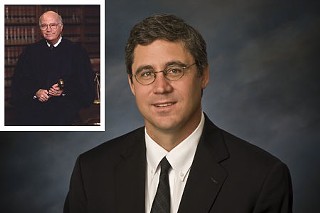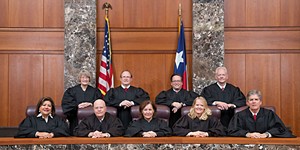Mission Impossible?
Hampton seeks to break GOP lock on Appeals court
By Jordan Smith, Fri., Oct. 22, 2010
Here's the thorny question facing local defense attorney Keith Hampton: What does it take to galvanize voters to elect a Democrat to the Republican-dominated Court of Criminal Appeals?
The state's highest criminal court, which, among other things, reviews all death penalty cases, has been the sole domain of Republicans since the 1998 election, when the last Democrat on that bench – current Travis County District Judge Charlie Baird – was replaced during a continuing GOP surge led by top-of-the-ballot Gov. George W. Bush. Since then, the Democrats haven't consistently challenged the GOP for any of the nine seats on the most powerful criminal court in the state. In a very real way, says Hampton, the Democrats have all but ceded the court to the Republicans. "Libertarians never fail to have a candidate," he says, but the Dem message to voters is along the lines of "just go to sleep on your couch for another election cycle."
As far as Hampton is concerned, it's time for a big change on the court, and he's determined to give incumbent Judge Michael Keasler (the Republican who unseated incumbent Baird in 1998) a run for the money. But the question remains: Will it be enough?
As far as the money is concerned, Hampton has raised and spent far more than Keasler, though the most recent reports, filed 30 days before the election, show Keasler with a slightly higher balance in his war chest – $10,221 compared to Hampton's $6,549. Keasler appears to be relying on his Republican incumbency to carry the day in a red state, but that hasn't protected him in the endorsement race. Hampton won the nod last month from The Dallas Morning News, which opined that Hampton would help "rebalance" the court, which is dominated by former prosecutors (seven of the nine judges). "If elected, [Hampton] would be the only member to have involvement in a capital murder case from indictment all the way to the U.S. Supreme Court."
Hampton, who was voted the most qualified candidate in the race by his peers, likes to offer this fact: He has more actual experience in death penalty cases than all of the current nine CCA judges combined. That seems to get attention at campaign rallies, he says. It's a factoid that has stayed with him since he began giving speeches earlier this year, because drawing voter attention to a race for the CCA is a job in itself. First of all, there's the fact that potential judges are limited in what they can say on the campaign trail; for example, they can't speak about issues that might come before them on the bench.
Hampton has worked hard to find a way to get people to listen – and to care. Among the highlights from his finessed campaign speech: This is the court that opined that "poor people accused of crimes are not entitled to a lawyer that is awake at trial," he says. "That's when people start to look up – that's an attention-grabber." Hampton says he tries to remind people that the business of this court is, in fact, life and death. And he's been doing this at some unlikely places – or perhaps, places where Democratic statewide judicial candidates haven't exactly spent a lot of time. For Hampton, this means courting voters in North and West Texas and speaking most anywhere he is invited – a schedule that had him shuttling from Lubbock to Odessa to Abilene, Utopia, Smithville, and back again several times this summer.
So far he's only attended one organized tea party event, at the Living Waters Church in Utopia, Texas, and he was pleasantly surprised by the warm (if initially skeptical) reception. It was clear at first, he says, that the 50 or so folks at the rally "generally assumed I was on the Republican ticket." He said, no, he's actually a Democrat. After his remarks, a man stood up and asked the first question: "Why are you a Democrat?" Hampton recalls. "He said it in a way that was like, 'But you're one of us!'" Hampton says he cracked up – and the rest of the crowd joined in. In all, he says, it was a very good experience – the kind of experience that has become a staple of his statewide campaign. Early on, he says, he decided that "if I wanted to be more than just my campaign, I'd head to places that others weren't going." Indeed, he argues that reaching out to unconventional crowds, at least for a Democrat, is the way to go: "Unless you reach out to them, you're conceding the field to the only other people who are talking to them." Whether this will make any difference in November, of course, remains to be seen.
Keasler declined an interview request, but did answer two Chronicle questions by e-mail. For starters, he notes he is most proud of his 12-year "record of clear, principled judicial decision-making, resulting in bringing Texas criminal jurisprudence back into the mainstream, while constantly striving to render justice in each individual case." (This appears to refer to his admission to the Morning News that the CCA has developed a "poor reputation" over the past years. Still, Keasler's assertion that he has helped bring the court back into the mainstream is a matter of opinion. In the Dallas case of Wesley Ronald Tuley, for example, Keasler joined a dissenting opinion, which concluded that the court isn't the proper place to lodge a claim of actual innocence when a defendant has discovered new and compelling evidence after he has already accepted a plea deal. A better venue for relief, the dissenters assert, is via the Governor's Office and the executive clemency process. (As it happens, Hampton was the lawyer who argued the case, and won, at the CCA.) Keasler also wrote that he is the better candidate for the job. He has 43 years of criminal law experience – starting as a prosecutor and trial judge in Dallas County – and has been endorsed by former Republican Texas Supreme Court Judges Tom Phillips, Craig Enoch, and Scott Brister. "Voters should want a judge who is fair and ethical, has intelligence and common sense, has a recognized expertise in his profession, has a strong work ethic, has the respect of his peers and those who come before his court, and considers all sides of issues with an open mind," he wrote. "Those who know me believe that I have these qualities." It's not that he means to disparage Hampton "and his accomplishments," he wrote. "I simply have a longer and more varied criminal law background."
Hampton would disagree, of course, but he has chosen not to attack the court or his opponent in the race. Rather, he says, he is interested in making the entire court better. And he is optimistic that his hard work racing across the state and standing before whatever crowd will listen, might in fact pay off for the Democrats for the first time in more than a decade – a chance that he feels is certainly possible, especially since it seems unlikely that Perry will bring to the polls a throng of excited straight-ticket voters. "Without a landslide," he says, "down-the-ballot guys are really out on their own."
Got something to say on the subject? Send a letter to the editor.











